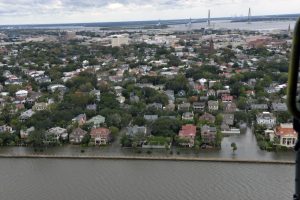Recently, our colleagues Michael Reese and Andrew Home posted their client alert discussing the Water Infrastructure Improvements for the Nation Act. This legislation creates new obligations as well as new opportunities for infrastructure constructors, owners/operators of public water systems and their lenders. This new legislation and related appropriations may pave the way for President-elect Trump’s proposed significant investment in American water infrastructure. The alert is titled 2016 Water Legislation Reaches New Areas & Sets the Stage for President-Elect Trump
Articles Posted in Construction Generally
Following the Remand of a Contentious Overtime Case, Chevron Deference May Be Murky
Last summer, in the waning stages of the Supreme Court’s 2015-2016 term, the U.S. Supreme Court issued an opinion reversing the U.S. Court of Appeals for the Ninth Circuit’s use of Chevron deference to overrule a district court which had decided that neither the Fair Labor Standards Act (FLSA) nor the varying interpretations of the special automotive dealership regulatory interpretations excluded service advisors from the exemptions for overtime compensation. The case is Encino Motorcars, LLC v. Navarro. Now, on remand, the Ninth Circuit, again, has concluded that service advisors are entitled to overtime pay and compensation.
Cal CSLB Registrar of Contractors and Chief Deputy Registrar Announce Pending Retirement
On November 29, the California Contractors State License Board (CSLB) issued an Industry Bulletin via email announcing that Cindi A. Christenson, the CSLB’s current Registrar of Contractors, will be retiring effective May 1, 2017. Christenson, the CSLB’s first female Registrar, was appointed to this position on January 1, 2015. Prior to her appointment as the Registrar, Christenson served for six years as CLSB’s Chief Deputy Registrar. A nationwide executive search for Christenson’s replacement is in process.
DOL’s New Overtime Regulations Face Uncertain Fate
Today, our colleagues Julia Judish, Rebecca Carr Rizzo and John Scalia published their alert discussing a U.S. District Court’s very recent issuance of a nationwide preliminary injunction preventing the Department of Labor from implementing and enforcing its new overtime regulations. Those regulations, which would have more than doubled the minimum salary level required to exempt executive, administrative, professional, and salaried computer professional employees from eligibility for overtime, would otherwise have been effective December 1. They note that although a preliminary injunction is a temporary court order, in light of the timing of the preliminary injunction and the upcoming change of Presidential administration, the ruling may foreclose the overtime regulations from ever taking effect. The alert is titled Preliminary Injunction Creates Uncertain Fate For Overtime Regulations.
Additional Source: U.S. Department of Labor More Than Doubles Minimum Salary Levels for FLSA Overtime Exemptions; Court Issues Nationwide Preliminary Injunction of DOL’s Overtime Rules Effective Dec 1
Court Issues Nationwide Preliminary Injunction of DOL’s Overtime Rules Effective Dec 1
In Federal Court Rules New Overtime Requirements Won’t Go Into Effect on December 1, our colleague Scott Flick discusses the U.S. District Court for the Eastern District of Texas’ ruling in a civil action challenging the Department of Labor’s (DOL) new overtime regulations. The civil action that was brought by the State of Nevada and 20 other states and recently consolidated with a related civil action brought by the Plano Chamber of Congress and over 50 other business organizations. Today, in response to a motion filed by states, the District Court granted a nationwide preliminary injunction, preventing the new salary threshold (and scheduled increases to it in future years) from going into effect until the District Court has had an opportunity to rule on the legality of the rule change. Effective December 1, the Final Rule would have, among other things, increased the minimum salary level for exempt employees from $455 per week ($23,660 annually) to $921 per week ($47,892 annually). In its ruling, the District Court made it clear that the DOL will have a hard time defending the rule change.
Registration Process in China Simplified
Yesterday, our colleagues David Livdahl, Jenny (Jia) Sheng, and Wenjun Cai published an informative client alert discussing the State Administration of Industry and Commerce’s (SAIC) October 18, 2016 Guiding Opinion on Opening-up Enterprise Name Database and Promoting the Reform of Enterprise Name Registration (Guiding Opinion). Now applicants for a company registration in the People’s Republic of China will be able to check the names of existing companies in the database to avoid using a duplicate name that will result in the application being rejected by the SAIC’s local counterparts (AICs). This is expected to simplify the company establishment process and, furthermore, SAIC indicated that it will abolish the name pre-approval requirement in the near future. The client alert is titled Another Step to Speed Up the Company Registration Process in China.
Is Your Use of Standard Subrogation Waivers Leaving You Exposed
We recently posted an interesting blog on Pillsbury’s Policyholder Pulse titled Subrogation Waivers and the Perils of Litigation: Wavering on a Precipice. In it, we discuss the perils of using standard subrogation waivers in your insurance policies, and cautions against the use of standard waivers (which can have unintended consequences).
Subrogation Waivers and the Perils of Litigation: Wavering on a Precipice. In it, we discuss the perils of using standard subrogation waivers in your insurance policies, and cautions against the use of standard waivers (which can have unintended consequences).
DC Circuit Rules That Basic Structure of CFPB is Unconstitutional
In a decision released on October 11, 2016, the U.S. Court of Appeals for the DC Circuit issued a very long opinion (110 pages) which vacates an order of the Consumer Financial Protection Bureau (CFPB) that requires PHH Corporation, a large home mortgage lender, to disgorge $109 million in a captive reinsurance arrangement the CFPB held to be illegal. The case is PHH Corporation, et al., v. CFPB. In so ruling, the panel majority, in a decision written by Judge Kavanaugh, holds that the basic structure of the CFPB—an independent agency wielding enormous power over the nation’s economy that is headed by a Director who is largely immune from any Presidential control or direction—essentially operates without any institutional checks on the exercise of his or her authority. Only a few “independent agencies” have ever operated under these conditions, and their powers were quite limited. The Court of Appeals holds that this arrangement has no historical basis and in effect violates the constitutional separation of powers.
Weathering a Storm – Action Plan to Maximize Insurance Recovery
Recently, our colleagues Tamara Bruno, Colin Kemp, Peter Gillon, Vince Morgan and Joseph Jean published an alert titled Hurricane Matthew Requires Immediate Action to Maximize Insurance Recovery to help you weather any storm.
Photo: U.S. Department of Agriculture – A MH-60 helicopter from the U.S. Coast Guard (USCG) Aviation Training Center Mobile, AL conducted a fly over of the Charleston, South Carolina area that was affected by Hurricane Matthew, on Friday, October 8, 2016. The Coast Guard is committed to the safety of the community, environment, and responders. USCG photo by Petty Officer 3rd Class Alexandria Preston – Creative Commons
Federal Contractors and Subcontractors Take Note of DOL’s Final Rule Requiring Paid Sick Leave
The U.S. Department of Labor has issued its final rule implementing President Obama’s 2015 Executive Order 13706, “Establishing Paid Sick Leave for Federal Contractors,” an executive order requiring federal contractors and subcontractors to provide their employees working on covered government contracts with up to seven days of paid leave per year for covered purposes. Our colleagues Rebecca Rizzo, Glenn Sweatt, Julia Judish and Dick Oliver discuss the final rule in their recent publication Department of Labor Issues Final Rule Requiring Federal Contractors to Provide Paid Sick Leave.
 Gravel2Gavel Construction & Real Estate Law Blog
Gravel2Gavel Construction & Real Estate Law Blog


